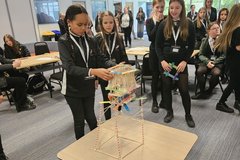Meet Niharika Sharma, the first in her family of teachers to study engineering. She is now blazing a trail for women on offshore rigs in India.
When Niharika hears the word “challenge”, her response is, “show me where!”
Niharika is one of the lead field engineers with Baker Hughes in India and grew up in the country’s far northern city of Shimla. “It’s the Himalayan part of India where it’s very cold and even snowy,” she says. “In my five years with Baker Hughes, I have traveled across India and wherever I go it is mostly hot. In the initial period of my career, when I was an intern, I was working in 40 to 45-degree Celsius temperatures and that was a huge challenge for me.”
That’s not a complaint. “My mother and my grandmothers are very strong women and always encouraged me to push myself and never let me doubt myself,” says Niharika. “They have been role models. My grandmother was the principal of one of the big schools in our area, at a time when a woman being a principal was not conventional. They always told me ‘You’ll never know if you don’t try – even if it is risky’. It has made me somebody who likes to take up challenges and go out of my comfort zone.”

It’s one of the reasons that she wanted to get into the energy industry. “I always liked science and math and wanted to be an engineer, but I didn’t want to go down the traditional engineering path, which in India is computer science or civil or mechanical engineering. I wanted to study petroleum engineering.”
Plunging in the deep end
As she neared the completion of her Bachelor of Technology at the University of Petroleum and Energy Studies (UPES) in 2018, she joined Baker Hughes for a two-month internship in completions and well intervention where she was eager to put her major in Applied Petroleum Engineering to work. “I didn’t want to be pushing paper – I wanted to apply what I had learned.”
Despite still being in college, she says she was encouraged to contribute. “My seniors told me they wanted to see what I have to bring to the table and to learn from my fresh eyes,” she recalls. “I really liked that culture of promoting our views even though I was a junior.”
Fast forward to 2023, when Niharika was lead field engineer in the deployment of Proxima™ advanced logging services for one of our key customers in India, which led to two important gas discoveries in Mahanadi Basin in the Bay of Bengal.


Niharika was one of the very few engineers trained on the Proxima system in India, and she became the only female engineer to work offshore on the customer’s deep water offshore rig. “Proxima is a new technology with more applications than existing tools, so the customer wanted to use it offshore for the first time,” she says. “I had already executed the service for another client onshore in India – I jumped for this opportunity and was willing to execute it in offshore and broaden my experience.”
It was the first time the full suite of Proxima services had been deployed for this customer in deepwater segment.
Taking new technologies offshore
Niharika had the dual challenge of being the lead engineer launching the Proxima platform in deepwater for this customer and the only female to work on the rig. The operator ensured that the deepwater offshore rig was “female friendly” in terms of facilities (most rigs don’t even have dedicated washrooms for women).

Even so, taking the 45-minute helicopter flight out to the rig knowing she was there for 20 days on her first stint, would have been daunting for many people. Not for Niharika. “When I went there, I really liked the environment, I really enjoyed my job, and the entire experience was amazing,” says Niharika. “People had told me how difficult everything is out there, such as times when the internet is not working and there is no connectivity to the client or anyone else back on land. But all the people on the rig were very cooperative knowing it was my first experience offshore.”
Success in deepwater for the operator in India
While launching Proxima on the drillship, Niharika returned for one month following her first 20-day stint. “Because Proxima is an advanced logging tool, it enables us to save a lot of rig time for that deepwater rig, where operational costs are higher than shallow water rigs,” says Niharika. “By saving significant rig time we were able to save a lot of cost to the client.”
Niharika and her team were also able to use the Proxima technology to acquire the required data on the first pass on each of the three phases of logging. The wireline logging work meant significant savings for the customer. “They were very happy with that – we did not waste any time and they told us it was executed flawlessly.”
In January 2024, the customer wrote to Baker Hughes, thanking the team for the seamless deployment of Proxima and saying, “We would like to congratulate and express our sincere appreciation to the Baker Hughes wireline team for commendable job execution.”

Niharika says, “I am proud that I am able to contribute to wireline logging in India and bring more jobs to the team and to Baker Hughes.”
Challenge accepted and completed.
Energy Forward Stories
Sign up to stay up to date on the latest innovations and people shaping the future of our industry.




